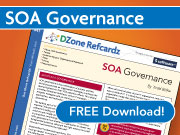 Privacy of information
Privacy of information
I saw this story about corporate data slipping out via Google Calendar and it hit home. I’m not a Google Calendar user, but I had briefly looked into it a little while ago when trying to figure out a way to give my wife visibility to my work calendar. If I recall, there was no way that I could easily give her a unique user id and password to be able to subscribe to my calendar via iCal. I certainly didn’t want to open it up to the general public to be able to do so.
I’m willing to bet that many of the corporate employees that were using Google Calendar were doing so to integrate their work schedule and their personal schedules, whether for their own use, their spouse’s use, or others. This is even more challenging for consultants, who probably have their corporate schedule from their consulting firm, plus their personal schedules, plus the corporate scheduling system from their clients. The consumer of this information (you and me) would like to manage it all in one spot, but the systems today simply don’t allow that to happen.
Let’s suppose, theoretically, that I could tell the corporate scheduling system to make my schedule available for synchronization with my calendar at home. That does create risks of exposing sensitive information as described in the article, such as dial-in numbers and passcodes, project names, etc. In reality, all I may need to know is whether the time is available or not. If I’m making it available to my wife, I’m really only interested in letter her know whether it’s okay to interrupt me at that time. To support this, we really need some fine-grained access control based on roles. That requires a couple things. First, it requires that we know the identity of the consumer of the information. That identity gets mapped to a role which provides appropriate context for the request. Secondly, I need the ability to map data elements to roles. It may even mean involve data manipulation rules. I don’t know of any calendar system that allows me to designate something as “okay to interrupt”, so I’d have to put that information in some other field. The situation quickly gets complicated.
This is a very simple, everyday case that we can all relate to, however, if we look at the overall use of information, it’s extremely difficult to understand all the different ways a given piece of information may be used and the roles and policies associated with each context. That doesn’t mean we should ignore it, however. There is clear room for improvement in what Google Calendar allows an individual calendar owner to do, just as there is clear room for improvement in corporate information security.
